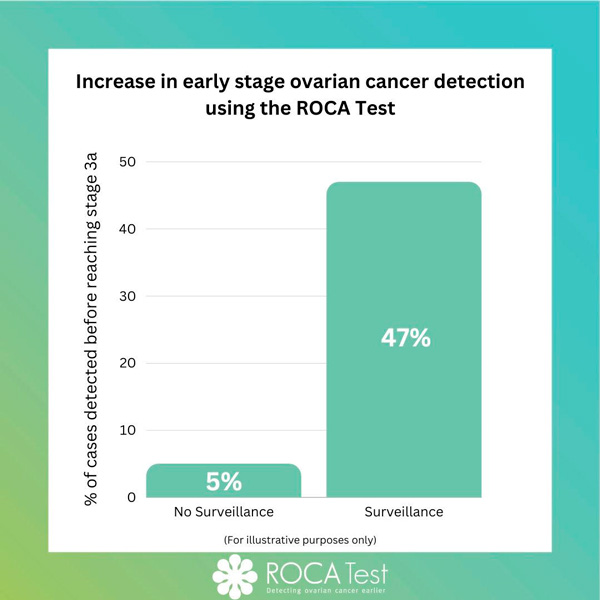In November 2022, the Journal of Medical Genetics published a paper that presented the results of a pilot national ovarian cancer surveillance programme using the ROCA Test, for women with alterations in the BRCA1 and BRCA2 genes. As part of the paper, this graph shows how ROCA surveillance can detect more early-stage ovarian cancer. We want to share these important findings with you.
There are 4 stages of ovarian cancer – Stages 1, 2, 3 and 4. Each stage is subdivided into sub-stages, for example, stage 1 is divided into stage 1a to 1b to 1c. The higher the stage, the more the cancer has spread or progressed. At Stage 1, the cancer is confined to the ovaries. By Stage 4 the cancer has spread to other parts of the body such as the liver or lungs.
Ovarian cancer tumours identified at stages 3 and 4 are more difficult to remove and often require chemotherapy before surgery. The more advanced the stage, the more likely the need for complex and prolonged surgery, and the cancer will more likely have a greater impact on life expectancy.
If you identify tumours at an early stage i.e. stages up to 3a, the tumour can usually be completely removed without the need for complex surgery.
In the graph above for cases detected before reaching stage 3a, the left-hand bar (with no ROCA surveillance) shows that only 5% of women with ovarian cancer were identified at Stages 1, 2 or 3a. This means that 95% of those women with ovarian cancer were diagnosed once the tumour had spread.
By contrast, the right-hand bar (with ROCA surveillance) shows that 47% of women with ovarian cancer were identified at stages 3a or less. Before stage 3a, the tumour can usually be removed completely without the need for complex and lengthy surgery.
The ROCA Test can be used once you reach the age of 35. Testing is recommended every four months, enabling the ROCA Test to find your healthy baseline and look for changes that may indicate the presence of ovarian cancer.
It is important to note that preventative surgery is the best way to reduce your risk of developing ovarian cancer. The ROCA Test cannot prevent ovarian cancer and should only be used by women who have chosen to defer that surgery.


